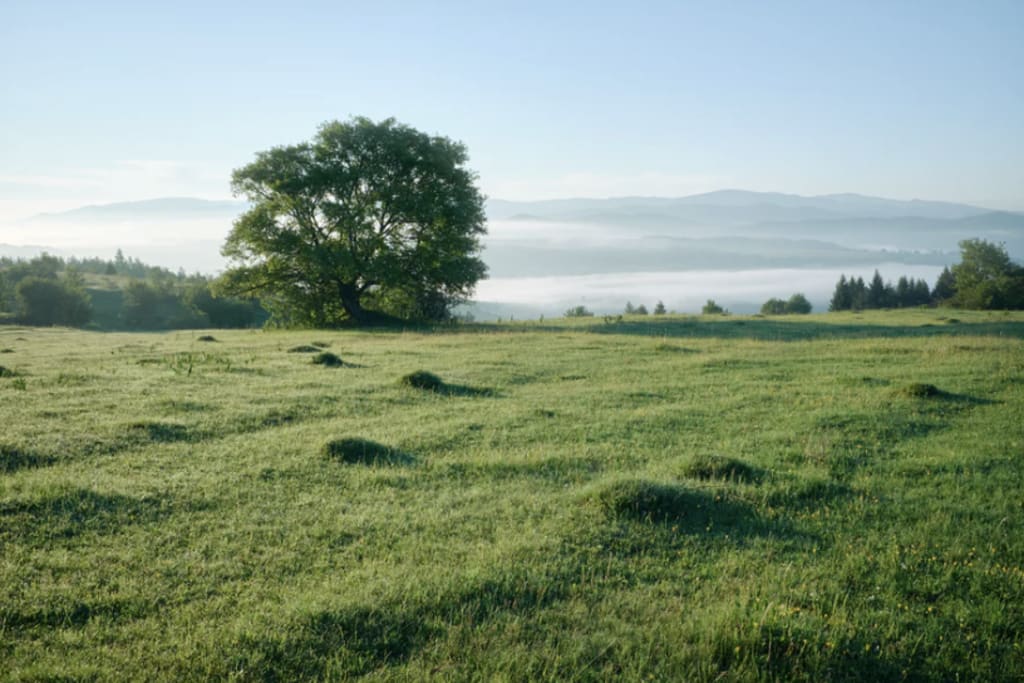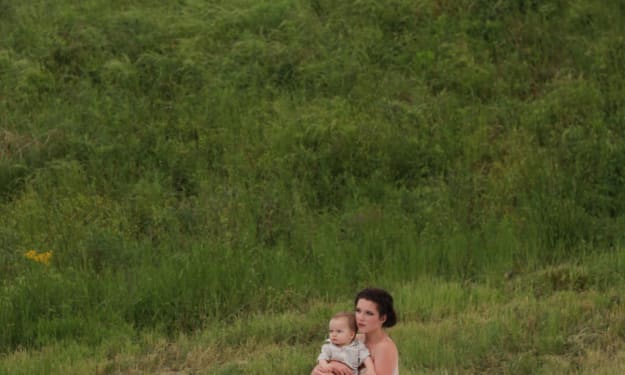
Brittle grass crunched beneath the man’s tired boots, which were greying with age and folding away at the corners. Still they carried him dutifully up the crest of the pasture, away from the sodden bales of hay and the crooked, lichen-drenched fences.
At the brow of the hill, the man paused. His feet settled rightfully into his shoes and his hands wormed into his pockets. There was a whisper of a breeze at this elevation, and the flannel that was draped over his angular frame flapped gently. He shivered without feeling the cold.
Looking into the cradle of the pasture he appraised what he sought; fragile wooden beams leeched by flaking, ivory paint that hardly remembered its own former beauty. Where the barn had once stood, there remained its meager bones.
It was just as he had left it. The grass around the barn had been seared into a state of indefinite resignation, stained with the ash that had memorialized the incineration of the farm. In the fourteen years that he had been absent, no one had bothered to remove the scant remnants of the structure. They hadn’t nursed the land either.
It was as though they knew that he would return, expecting the artifacts of his youth entrenched in the plain as he had last seen it.
The man lurched over the hill, feeling a solitary tear meet his eye as he came closer to the massive skeleton. It loomed before him, the framework of his childhood; the remembrance of its passing.
He could identify the pieces of it, this barn he had once known so well, despite its decay and his distance from it. He could recognize the cumbersome arc that had supported the tin roof, that longed for the rain’s incantations on its face. He could detect the outline of the sole, south-facing window, whose shutters’ iron latch likely remained in the dirt. He still could even harp his eyes upon the gilded chain links that kept the lambs within their pens as they were groomed.
He paused at the doorway, wrought with something that might have mimicked emotion. His fingers trembled as they recalled their own uses here. The tending of stock was, of course, expected, and he could still feel the cracked broom he had once used to sweep the stalls. These were hardly memories but sensations, like the wounds from the whip still burning across his once scrawny back.
“You’ve been out here for five hours and accomplished naught. Lazy boy!” The farmer gestured wildly at the barn, its disarray. The boy had tried, of course, to appease the doddering farmer. But days without food had weakened him, and as he attempted to focus the floor seemed to swim towards him. The farmer’s heaving breaths accosted the boy’s face as his palm fell along the child’s cheek, knocking him to the ground. The boy’s dazed, exhausted eyes hung towards the floor in submission. He knew what followed the farmer’s disappointment.
The farmer himself must’ve been spent from attending to the grounds of the farm, because he didn’t bother to harm the boy farther. Instead he grunted noisily as he grabbed the child’s forearm, dragging him towards the animals’ pen. The boy didn’t fight back. Disobedience was known to merit vastly more severe consequences than idleness.
“Think about what you’ve done.” The farmer uttered venomously as he trapped the boy to the pen’s holding chain. He cast his bloodshot, sloping eyes around the room, wrinkling his crooked nose in disgust. “Or rather, what you haven’t.”
A storm had followed that punishment, a storm lasting four days. The tin roof never stopped rattling, not for a second, and the boy hardly rested. On the third day the hogs had run out of food and they took to nibbling the boy’s hair, face, and clothes in search of it.
He began to be uncertain he would ever see the farmer again.
But on the fifth day the roof was silent, and golden light drizzled in through the cracks in the walls. It was noon when the farmer trudged the slight path out to the barn, doused in the scent of cigarettes and labor. He coughed heavily, his age betraying him.
The boy was cast against the wall, gazing blankly at the ceiling. His fingers drooped from the rope that had restrained him. His body was rigid as the stock grazed over him for nourishment.
Upon the farmer’s entry, the animals grazed to him, and he gathered their feed so as to place it in the troughs. He raked the mess from the barn floor, replacing the straw as he went. Only then did he turn his attention to the boy.
His thick, trembling fingers had fumbled only briefly while he untied the child, inhaling deeply the potent odor of waste percolating over his fragile body. He was too young to be a burden to the farmer, despite the farmer’s senility, and the old man carried him easily to the threshold. He reached for the matches to light the lantern for the animals, a refuge long lost in the past days’ storm.
The boy moved, then.
The man’s fingers found the threshold, recalling the frantic way his feeble arms and legs had barraged the old farmer, escaping from his weathered grip and lunging then for the farmer’s unsteady ankles. The boy had rehearsed his plan in his mind endlessly over the course of those stormy days in the pen, despite his weariness and delusion. It had seemed, then, that his foggy mind had forgotten all other words.
Get the matches. Latch the door. Fasten the window. Burn it down.
It had been simple, yes, in comparison to the years following. The barn seemed, in fact, to be intended for the divine purpose of requitement. The farmer had ensured no creatures could escape it without approbation. It had been his very abuse of the structure that ensured his extinguishment.
The boy, if he could even be called one, had watched the barn’s incineration with a stony disposition from the dense line of conifers that surrounded the property. He had hardly felt relief, no, instead, he only felt assurance. Assurance of the devoir that now called upon him – a purpose, perhaps, if he believed in those.
The blue-suited government agent that had been assigned to him was the next prioritization. The boy had resided with the farmer for years, almost four, in fact, and in the hasty course of those dozen visits she had taken a sovereign effort to neglect the offensive smell of the boy, his deconstructed clothes, and his depressed demeanor. If she had just once asked the boy of the indigo and olive eggs painting his arms and legs, or of the scabs flocking his dainty knuckles, perhaps he could’ve forgiven her.
She hadn’t so much as asked for her life, in the end.
The following woman, the prying hag who had punished him harshly for sleeping with his nose in the pages of his arithmetic, she had taken the most time. Years following the incidents that transpired under her punitive gaze, she retired to the coast, and the man had attributed years of investigation to the divulgence of her modest, sea-facing shanty.
The man raised his nose to the air, now. He could just detect the rancid stench of perishing timber, the smudged, hot glass of the dated windows of the farm ranch popping in the fever of the flames. He imagined the structure was beginning to crumple into itself, now, collapsing under the weight of the scrapped family it had belonged to.
The farmer’s wife had been just as he expected her, holding herself still captive in that shell of a home that had felt only wrath in the years he had known it. Had she felt peace after the death of the farmer, or had his passing wracked her body into the wheelchair she occupied? He had watched her for only a few minutes from the bay window extending from the stagnant kitchen, still arranged as he had last seen it. Her delicate body was frighteningly still in its seat as she gazed impassionedly into the parlor that had not welcomed guests for its entirety. This static view made the most sense to the man, as that was what the farmer’s wife had been as well – stagnant – as she tolerated the farmer’s maltreatment, and relinquished it all too easily onto the boy.
The man now stepped within the pathetic heap of desiccated lats. His legs knew their way around the barn, despite his time apart from it. All the nights he had spent, dejected, in the corner of the pen, had ensured that.
He knelt now, keeling over the dusty floor he had once slept on. He pulled a quaint, rusted garden spade from his breast pocket, preparing to unearth the hole he had once dug with the heels of his naked, child feet. It was only ten full scoops deep – but it had been enough.
The man reached into the earth, the anticipation in his chest rattling beneath his skin. He removed the tiny composition book from the burlap sack that protected it, finding the pages crisp and rough. Their crinkling struck his unassuming ears, but it wasn’t hard to find the page he desired. There was only one used in the book.
He knew the four names on the page without reading them, after all, they had occupied his body and mind for close to a decade and a half.
He heard the sirens now. If he wanted to escape, he had to run.
Instead, he reached into his pocket for the only other item he possessed. An aged, ballpoint pen.
He dragged the nib tentatively at first across the names on the page, then furiously over and over until they didn’t exist at all. He had made sure of that.
Now, at last, he rested.






Comments
There are no comments for this story
Be the first to respond and start the conversation.